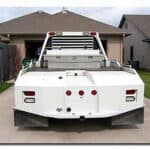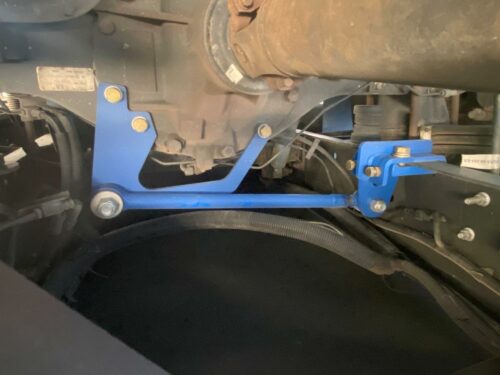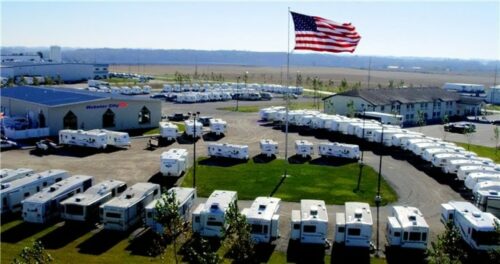For the safety of your family and others around you, it is crucial to understand and stay within the weight ratings of your RV and tow vehicle.
Unfortunately, understanding RV weights and capacities isn’t straightforward. So let’s break them down into digestible pieces.
Actual/Scale Weight vs Rating/Limit/Specification/Maximum
- Actual weights: Measured weight of the vehicle or its components. Factory quoted weights may be averages or estimates of actual weight.
- Ratings: Weight ratings are limits placed on the vehicle or its components, which should never be exceeded. Ratings are typically maximum capacities.
Ratings are generally set by the OEM manufacturer and cannot be changed no matter what aftermarket modifications you make.
Weight and load are generally used interchangeably. RVs have weight, which can be measured by a scale because loads are imparted to the tires and hitch.
For instance, GVW is how much a vehicle actually weighs when measured. GVWR – notice the “R” for rating? – is how much the vehicle can possibly weigh as limited by the manufacturer.
The most common confusion about weights occurs when the two above categories are mixed.
One-Size-Fits-All Terms
Some weights, such as GVW (Gross Vehicle Weight) are one-size-fits-all. Any vehicle, whether a towable, motorhome, truck or truck camper, can have a GVW. After all, GVW is simply how much the vehicle weighs!
Contextual Terms
Other numbers, such as RGAWR (Rear Gross Axle Weight Rating), only make sense in the context of a vehicle with independent front and rear axles, such as a pickup truck or motorhome.
Or consider [king] pin weight. A motorhome doesn’t have a king pin. Neither does a cargo trailer. Just a fifth wheel! Therefore, we only talk about king pin weights with regard to fifth wheels.
Synonymous Terms
Some acronyms are synonymous or very close to it! What’s the difference between wet weight and curb weight? Nothing! But if you’re talking about trucks, you usually use the term “curb weight,” and if you’re talking about motorcycles, you use the term “wet weight.”
Same thing with GTW (Gross Trailer Weight). It means the exact same thing as GVW, but instead of V for vehicle, someone’s substituted T for trailer.
Let’s look at another example. What’s the difference between a truck hitch weight and a travel trailer tongue weight? Theoretically, just about nothing! The weight is measured at the exact same point!
It’s all about perspective. From the truck’s perspective, it’s weight on the hitch, and from the trailer’s perspective, it’s weight on the tongue. Same weight; different perspectives! In fact, both may be referred to as Vertical Load.
Informal Terms
What UTW?
Well, whatever you want, I suppose! (It’s not a formal acronym used in any SAE standard I’ve read.) You might see this referred to as Unloaded Trailer Weight, but it’s not a canonical term, so it may mean different things to different people. So be careful!
Canonical terms are generally set or adopted by the Recreational Vehicle Industry Association (RVIA) in conjunction with the Recreational Vehicle Dealers Association (RVDA) and Recreational Vehicle Safety & Education Foundation (RVSEF).
Tow vehicles are outside of the RVIA purview and use their own vernacular.
Deprecated Terms
So terms are no longer in formal use. For instance, Net Carrying Capacity (NCC) was used from 1996 to 2000. From 2000 onwards, CCC became the standard.
DISCLAIMER: While we believe that all information on this website is accurate, we can not guarantee that it is applicable to you specifically or to Your situation. More »
On this page we define and provide details about the following weights:
Cargo Weight, Curb Weight, Dry Weight, FGAW, FGAWR, GAW, GAWR, GCW, GCWR, GTW, GVW, GVWR, King Pin Weight, Maximum Loaded Trailer Weight, Payload, RGAW, RGAWR, Tongue Weight, UVW



Dry Weight
Dry Weight is the actual weight of a vehicle or trailer containing standard equipment without fuel, fluids, cargo, passengers, or optional equipment.
We have seen the following variations to this definition:
- Includes commonly ordered optional equipment
- Includes fluids of generator and other onboard equipment (oil, coolant, fuel)
- May or may not include RV batteries
Pay close attention to how the manufacturer defines Dry Weight because this is often used to calculate other weights, such as the cargo carrying capacity or Payload.
UVW: Unloaded Vehicle Weight
- Vehicle weight as manufactured at the factory
- Full fuel tank weight
- Equipment fluids weight
Unloaded Vehicle Weight (UVW) is the weight of a vehicle as manufactured at the factory. It includes full engine and generator fuel tanks and fluids, if applicable. It does not include cargo, water, propane, or dealer-installed accessories. Be aware that some manufacturers weigh each unit to determine UVW, while others provide only the average or estimated weight for each model.
We have seen the following variations to this definition:
- Includes actual factory installed options
- Includes commonly ordered factory installed options
Pay close attention to how the manufacturer defines UVW because this is often used to calculate other weights, such as the cargo carrying capacity or Payload.
SCWR: Sleeping Capacity Weight Rating
SCWR, by definition, is 154 pounds times the number of passengers carried in transit.
- Travel trailer: Easy! It’s always zero! You can’t carry passengers in a travel trailer by law.
- Motorhome: 154 pounds times sleeping capacity.
- Fifth Wheel: Ehh … more difficult. In some states, you’re allowed to carry passengers while in transit. Others, you’re not.
Example: If a motorhome has a master queen bed, two single bunk beds and a convertible short twin dinette, the SCWR is (2+1+1+1)*154 lbs = 770 lbs.
Please note the SCWR assumes the average passenger weight is 154 pounds. If you have a husky family, understand that your cargo carrying capacity may therefore be less than what’s shown on the sticker.
Cargo Weight
- Personal cargo weight
- Optional equipment weight
- Tongue Weight or King Ping Weight
Cargo Weight is the actual weight of all items added to the Curb Weight of the vehicle or trailer. This includes personal cargo, optional equipment, and Tongue or King Pin Weight.
This number is important because it will determine how many things you can safely pack into your RV. Within this number you need to fit the weight of your clothes, shoes, linens, books, dishes, beer, cleaning supplies, computer equipment, hiking gear, bicycles, water sport implements, food, beer—basically everything you want to take with you.
CCC: Cargo Carrying Capacity
Cargo Carrying Capacity (CCC) is a formal term you’ll find on the Tire Sticker of your RV.
Unfortunately, is also one of the most confusing terms in the RV vernacular.
CCC is NOT equal to GVWR – UVW! In other words, it’s not equal to the maximum weight minus the empty weight.
It used to be. But now, RVIA has different rules. Today, CCC is what’s leftover after the weight of passengers in transit and “operating fluids” have been factored in.
CCC is usually calculated as GVWR minus the following:
- (UVW) Unloaded Vehicle Weight
- Weight of full freshwater tank
- Weight of full water heater tank
- Weight of the propane only in full onboard propane tanks
- SCWR (Sleeping Capacity Weight Rating).
Example: The Class B van from Totally Terric Trailers LLC has UVW of 5000 lbs, a GVWR of 7000 lbs, a 50-gallon freshwater tank, a tankless water heater, two 20-lb propane tanks and a SCWR of
- Personal cargo weight
- Optional equipment weight
- Tongue Weight or King Ping Weight
Cargo Weight is the actual weight of all items added to the Curb Weight of the vehicle or trailer. This includes personal cargo, optional equipment, and Tongue or King Pin Weight.
This number is important because it will determine how many things you can safely pack into your RV. Within this number you need to fit the weight of your clothes, shoes, linens, books, dishes, beer, cleaning supplies, computer equipment, hiking gear, bicycles, water sport implements, food, beer—basically everything you want to take with you.
Payload
- Cargo Weight
- Persons weight
Even though it does not include an R, Payload is a weight rating. It is the maximum weight that persons plus cargo should never exceed.
Payload is derived by subtracting Curb Weight from GVWR. In other words, the difference between a vehicle with standard equipment and the maximum allowed weight.
Curb Weight
- Vehicle weight with standard equipment only
- Full fuel tank weight
- Full fresh water tank(s) weight
- Full propane container weight
- Equipment fluids weight
Curb Weight is the actual weight of a vehicle or trailer including all standard equipment, full fuel tanks, full fresh water tanks, full propane bottles, and all other equipment fluids, but before taking on any persons or personal cargo.
We have seen the following variations to this definition:
- Includes driver
- Includes optional equipment
Pay close attention to how the manufacturer defines Curb Weight because this is often used to calculate other weights, such as the cargo carrying capacity or Payload.
Tongue Weight or King Pin Weight
Tongue Weight (also called Tongue Load) is the actual weight pressing down on the hitch ball by the trailer. The recommended amount of Tongue Weight is 10-15% of the GTW.
King Pin Weight (also called Pin Weight) is the actual weight pressing down on the fifth wheel hitch by the trailer. The recommended amount of King Pin Weight is 15-25% of the GTW.
These weights are added to the tow vehicle’s GVW.
GAW: Gross Axle Weight
Gross Axle Weight (GAW) is the actual weight placed on a single axle. Assuming a well-balanced vehicle, the GAW is then evenly distributed to all tires on that axle.
In addition to the axle weight rating, the GAW must be within the tire weight ratings as well. To determine the amount of weight placed on each tire, divide the GAW by the number of tires on the axle.
You may see the more specific RGAW, when referring to the rear axle, or FGAW, when referring to the front axle.
GAWR: Gross Axle Weight Rating
Gross Axle Weight Rating (GAWR) is the maximum number that the GAW of a single axle should never exceed. You may see the more specific RGAWR, when referring to the rear axle, or FGAWR, when referring to the front axle.
GCW: Gross Combination Weight
- GVW of tow vehicle
- GVW of towed vehicle
Gross Combination Weight (GCW) is the actual weight of the fully loaded tow vehicle plus the towed vehicle (trailer, car, boat, etc.), including all cargo, fluids, passengers, and optional equipment.
If your RV is composed of more than one unit (towing a trailer or a vehicle), then the GCW is the total weight of all connected vehicles and everything in them.
Again, the only way to accurately determine the GCW is to drive the entire assembly on a scale. You may also determine the GCW by adding up the individual GVW’s of all components.
If you weigh the components separately, make sure that they are configured and loaded exactly as you will be when traveling.
GCWR: Gross Combination Weight Rating
Gross Combination Weight Rating (GCWR) is the maximum number that the tow vehicle GVW plus towed vehicle GVW (or GTW) should never exceed.
GVW: Gross Vehicle Weight
- Curb Weight
- Cargo Weight
- Persons weight
Gross Vehicle Weight (GVW) is the actual weight of the fully loaded vehicle or trailer, including all cargo, fluids, passengers, and optional equipment, as measured by a scale.
If you are in an RV and not towing anything, the GVW is the total weight of the RV and everything in it. If your RV is composed of more than one unit (towing a trailer or a vehicle), then the GVW is only part of the total.
The GVW is important because without this number you can not determine if you are within the limits set forth by the manufacturer, laws, and regulations. This number can be approximated based on information provided by the manufacturer or dealer, but the only way to be sure is to drive the RV on a scale and measure it.
GVWR: Gross Vehicle Weight Rating
Gross Vehicle Weight Rating (GVWR) is the maximum number that the GVW or GTW should never exceed. GVWR is applied to trailers as well as vehicles, but you may see this rating referred to as the Maximum Loaded Trailer Weight.
GTW: Gross Trailer Weight
- All GAW’s
- Tongue Weight or King Ping Weight
- Weight on all deployed jacks
Gross Trailer Weight (GTW) is the same as Gross Vehicle Weight (GVW) when referring to a trailer. While GVW can be applied to tow vehicles and trailers, GTW makes it clear that we are speaking of a trailer.
When connected, a portion of the trailer’s weight is transferred to the tow vehicle through the hitch. In this case the GTW includes all axle GAW’s and the Tongue Weight or King Pin Weight.
When not connected to the tow vehicle, the trailer’s weight rests on its own tires and on all deployed support and stabilizing jacks. If you are weighing a trailer without the tow vehicle, be sure to place the entire unit on the scale, including all jacks.
Andy Herrick is a blogging nerd, #8 Enneagram, wannabe bread baker, INTJ, RV industry professional, and small business entrepreneur. He can be found hanging out with his lovely wife and family, skiing, cycling, climbing, hiking, and convincing anyone who will listen why dogs aren’t really that great of pets. Also, he runs this website.










